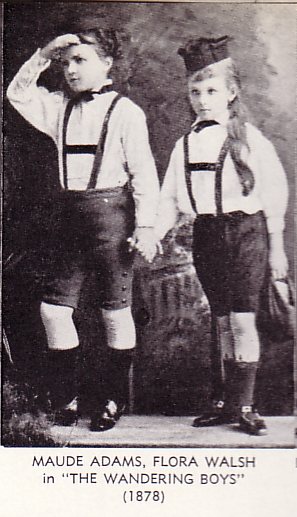
Wandering Boys


The play deals with Count de Croissy who owns the Castle of Olival in France. His sister, the Baroness, wants the castle for herself. Unfortunately for her the Count marries and has two sons which means they would inherit the castle.
The Count goes to Sicily and is gone for many years and is considered dead. He was a good man and built an orphanage in the village he founded. He signed a document that stated that if any two orphan boys should enter the village during its yearly Festival and were deemed worthy they were to be adopted and cared for.
The Castle burns down under suspicious circumstances. His wife and sons are assumed to have died in the fire but actually had been saved by a friend of the Count. The Count himself is neither dead nor absent; he is disguised as a deaf porter, Francis.
Eventually two boys arrive, Paul, the older one, and Justin, the young one who was played by Maude Adams. Justin sings a song that tells their story. It turns out that they are the Count's sons.
The Baroness has the two boys taken to the castle and locked up (although I thought the castle had burned down which creates a bit of a problem). The secretary for the Baroness wants to poison the boys but the Count, in his disguise, helps the boys escape and the secretary ends up getting poisoned instead.
=====Jacksonian Jew: The Two Worlds of Mordecai Noah Book by Jonathan D. Sarna, Jonathan D. Sarna; Holmes & Meier, 1981=====
With the excitement of the 1812 election past, Noah turned to the third of his three occupations (after politician and journalist): he wrote a play. The melodrama, Paul and Alexis, or the Orphans of the Rhine , was commissioned by Charles Young for his actress wife, a woman Noah remembered as "remarkable for her personal beauty and amiable deportment." Mrs. Young apparently wanted to play a male role; Noah obligingly fashioned her one from a popular French drama: R.C. Guilbert-Pixerécourt's Le Pélerin Blanc . To his credit, Noah did not merely translate from the French as did so many of his contemporaries. He added a new character, and he adapted many parts of the play for an English-speaking audience. But the basic plot of the play still dealt with the efforts of Paul and Justin ("the wandering boys") to regain their rights to an estate which a cousin had usurped. Surviving a variety of obstacles, including a near poisoning, the boys ultimately triumphed over adversity and achieved their objective.
To a modern critic, Paul and Alexis is "a poor thing" with "dropsical prose." But it ranked among the best of its genre; Noah was one of but six early American playwrights to borrow anything at all from the French stage. His play was innovative, and it enjoyed wide popularity. It later appeared on the London stage, only the second American play ever to be so honored. After being adapted by John Kerr, who renamed the play The Wandering Boys , the drama returned to the United States where it played successfully for many years.
|